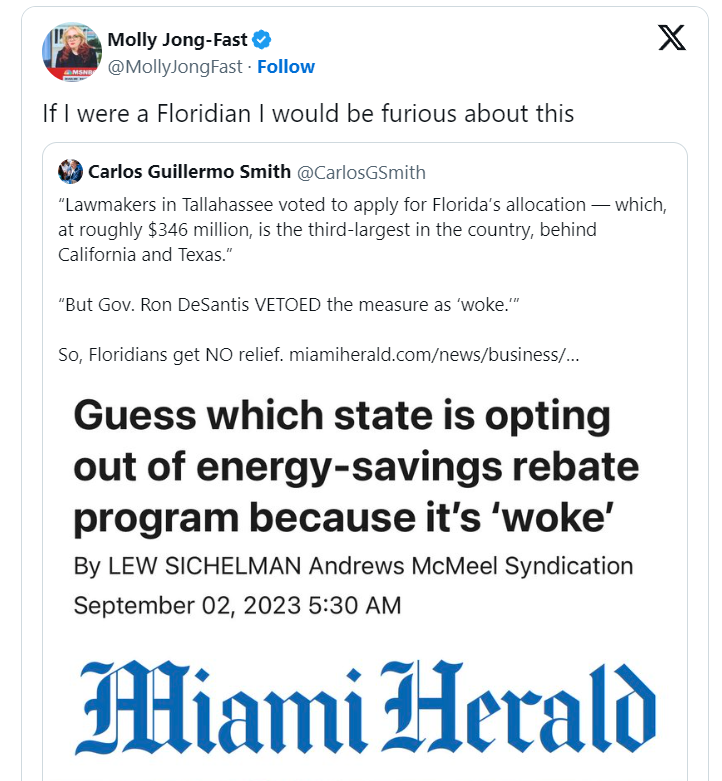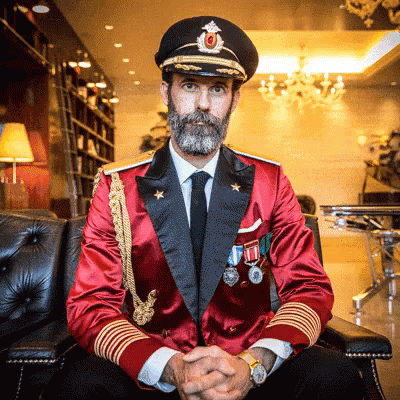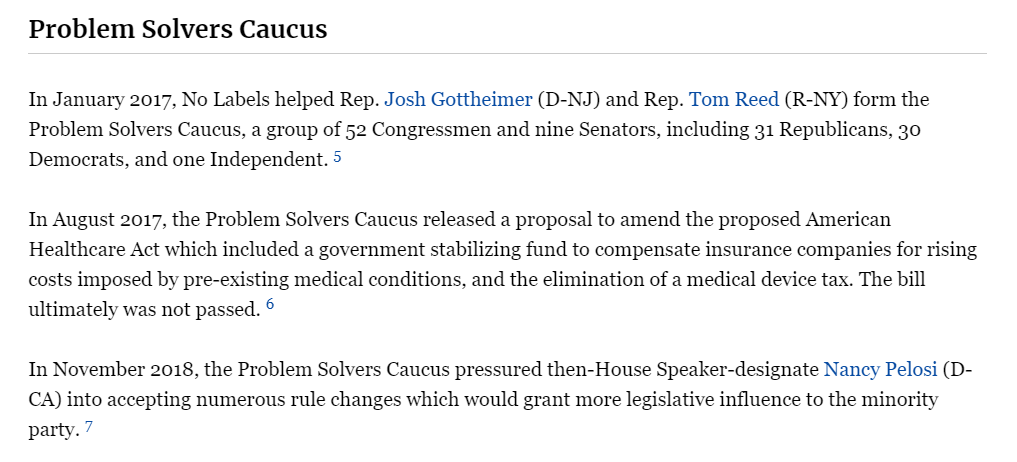Welcome to DU!
The truly grassroots left-of-center political community where regular people, not algorithms, drive the discussions and set the standards.
Join the community:
Create a free account
Support DU (and get rid of ads!):
Become a Star Member
Latest Breaking News
Editorials & Other Articles
General Discussion
The DU Lounge
All Forums
Issue Forums
Culture Forums
Alliance Forums
Region Forums
Support Forums
Help & Search
Celerity
Celerity's Journal
Celerity's Journal
September 5, 2023


https://www.miamiherald.com/news/business/real-estate-news/article278782484.html
Homeowners, which of these consumes more energy in your house: space heating or water heating? Either way, Uncle Sam is ready to help you pay for some energy-efficient upgrades. The Inflation Reduction Act, signed into law by President Biden a year ago, created two energy-efficiency rebate programs that could pay some, or even all, of the costs of buying Energy Star-rated appliances, adding insulation or otherwise making your home more efficient.
The rub: States will administer the programs, and each one must apply for its share of the $8.8 billion in federal funds earmarked for the rebates. And some states may opt out. The states’ application window opened this summer, when the Department of Energy issued the program’s guidelines, and will close on Jan. 31, 2025.
DoE expects the majority of states will have their programs up and running by early 2024. The rebates will be available to homeowners until Sept. 30, 2031, or until their respective state depletes its grants. Declined funds will be redistributed to other states. One state has already indicated it probably won’t participate.
Lawmakers in Tallahassee voted to apply for Florida’s allocation — which, at roughly $346 million, is the third-largest in the country, behind California and Texas. But Gov. Ron DeSantis vetoed the measure as “woke.” The DoE has not been officially notified, so DeSantis could still change his mind.
snip
If I were a Floridian I would be furious about this
https://twitter.com/MollyJongFast/status/1698666707638755592

https://www.miamiherald.com/news/business/real-estate-news/article278782484.html
Homeowners, which of these consumes more energy in your house: space heating or water heating? Either way, Uncle Sam is ready to help you pay for some energy-efficient upgrades. The Inflation Reduction Act, signed into law by President Biden a year ago, created two energy-efficiency rebate programs that could pay some, or even all, of the costs of buying Energy Star-rated appliances, adding insulation or otherwise making your home more efficient.
The rub: States will administer the programs, and each one must apply for its share of the $8.8 billion in federal funds earmarked for the rebates. And some states may opt out. The states’ application window opened this summer, when the Department of Energy issued the program’s guidelines, and will close on Jan. 31, 2025.
DoE expects the majority of states will have their programs up and running by early 2024. The rebates will be available to homeowners until Sept. 30, 2031, or until their respective state depletes its grants. Declined funds will be redistributed to other states. One state has already indicated it probably won’t participate.
Lawmakers in Tallahassee voted to apply for Florida’s allocation — which, at roughly $346 million, is the third-largest in the country, behind California and Texas. But Gov. Ron DeSantis vetoed the measure as “woke.” The DoE has not been officially notified, so DeSantis could still change his mind.
snip
September 4, 2023

https://www.washingtonpost.com/world/2023/09/01/seychelles-china-us-diplomatic-relations/
https://archive.ph/DnXI1

MAHE ISLAND, Seychelles — At the height of the Cold War, the U.S. Air Force tracking station that monitored Soviet satellites from this island’s soaring tropical forests was a focus of Seychelles life. The American servicemen and technicians living nearby hosted barbecues and bar nights to which all Seychellois were invited, distributed cookies and milk to local children and taught them basketball. Then, the Cold War ended, the Soviet Union collapsed and in 1996 the Americans left, dismantling the tracking station and shutting down their embassy — citing budgetary reasons for abandoning what had seemingly become an irrelevant corner of the world.
Today, the compound where Americans and Seychellois partied is home to the Seychelles Tourism Academy, where young islanders training to be tour guides, hoteliers and masseuses take classes, among other subjects, in Chinese — just one small manifestation of a new geopolitical rivalry that has now lured the Americans back. In June, Seychelles became the latest in a string of small nations around the world in which the United States has established, restored or is planning to open an embassy as part of a broad pushback against the influence China has acquired during more than two decades of neglect or disinterest on the part of the United States.

All are in small islands that had been judged insufficiently strategic by Washington to merit the cost of maintaining a diplomatic presence, including Seychelles, Tonga and the Solomon Islands, where embassies have been opened this year, and Maldives, Vanuatu and Kiribati, where embassies are planned, according to the State Department. Seychelles offers an example of the ways America’s absence opened the door to Chinese influence. In the 27 years since the United States pulled out, China has built schools, hospitals, houses for low-income families and public amenities, winning sympathy among Seychellois who felt abandoned by the U.S. departure.
“They do the little things that America doesn’t do. This is where the Americans are weak. There is nothing we can say America built,” said Seychelles President Wavel Ramkalawan in an interview. “This is why countries like China have come in, because there was a vacuum.” Seychelles officials say they are delighted to have the Americans back but also recognize that China is likely the main reason for the return, potentially pulling Seychelles into the big power rivalry. “We cannot say we are naive. We do understand the competition going on. In the Cold War we had the United States and the Soviet Union and now it is the United States and China,” Seychelles Foreign Minister Sylvestre Radegonde said in an interview. “Someone woke up and realized how important it is to counter the Chinese influence.”
snip





In China's shadow, U.S. rushes back to neglected Seychelles

https://www.washingtonpost.com/world/2023/09/01/seychelles-china-us-diplomatic-relations/
https://archive.ph/DnXI1

MAHE ISLAND, Seychelles — At the height of the Cold War, the U.S. Air Force tracking station that monitored Soviet satellites from this island’s soaring tropical forests was a focus of Seychelles life. The American servicemen and technicians living nearby hosted barbecues and bar nights to which all Seychellois were invited, distributed cookies and milk to local children and taught them basketball. Then, the Cold War ended, the Soviet Union collapsed and in 1996 the Americans left, dismantling the tracking station and shutting down their embassy — citing budgetary reasons for abandoning what had seemingly become an irrelevant corner of the world.
Today, the compound where Americans and Seychellois partied is home to the Seychelles Tourism Academy, where young islanders training to be tour guides, hoteliers and masseuses take classes, among other subjects, in Chinese — just one small manifestation of a new geopolitical rivalry that has now lured the Americans back. In June, Seychelles became the latest in a string of small nations around the world in which the United States has established, restored or is planning to open an embassy as part of a broad pushback against the influence China has acquired during more than two decades of neglect or disinterest on the part of the United States.

All are in small islands that had been judged insufficiently strategic by Washington to merit the cost of maintaining a diplomatic presence, including Seychelles, Tonga and the Solomon Islands, where embassies have been opened this year, and Maldives, Vanuatu and Kiribati, where embassies are planned, according to the State Department. Seychelles offers an example of the ways America’s absence opened the door to Chinese influence. In the 27 years since the United States pulled out, China has built schools, hospitals, houses for low-income families and public amenities, winning sympathy among Seychellois who felt abandoned by the U.S. departure.
“They do the little things that America doesn’t do. This is where the Americans are weak. There is nothing we can say America built,” said Seychelles President Wavel Ramkalawan in an interview. “This is why countries like China have come in, because there was a vacuum.” Seychelles officials say they are delighted to have the Americans back but also recognize that China is likely the main reason for the return, potentially pulling Seychelles into the big power rivalry. “We cannot say we are naive. We do understand the competition going on. In the Cold War we had the United States and the Soviet Union and now it is the United States and China,” Seychelles Foreign Minister Sylvestre Radegonde said in an interview. “Someone woke up and realized how important it is to counter the Chinese influence.”
snip





September 4, 2023

A state that protects—and a bulwark for democracy and modernity. Is this, Robert Misik asks, the new paradigm of the democratic left?
https://www.socialeurope.eu/olaf-scholz-the-improbable-role-model

Foreign Policy, the American magazine with focus on international affairs, surprised me ten days ago with a headline: ‘Welcome to the West’s Olaf Scholz Era’. The German chancellor, said the standfirst, ‘represents the future of progressive politics’. The (British) author of the piece, John Kampfner, recognised that in his personal style Scholz has ‘few characteristics of a potential savior’. But in a quiet, unexcited way his coalition is radically modernising the German economy for the first time, while his foreign-policy orientation has undergone a complete change—which usually happens at most once in a generation. The successes are impressive.
Yet Scholz’s style consists of not talking too much, explaining little and giving the impression that everything is taking its necessary course, trusting that the reasonableness of this policy will be obvious to everyone in the end. It is an ‘incremental revolution’, according to Kampfner. Scholz is also symptomatic of contemporary progressivism in a second respect. Governing in shaky alliances, which only allow the smallest compromises with a more and more fragmented electorate—making the leader more of a conductor—will be the reality everywhere in the future. The Foreign Policy piece is smart but a bit pretentious. For a new ‘era’ one would hope something like a paradigm would be outlined. Yet the analysis does go against the current: leading articles celebrating the Scholz government as a success story are thin on the ground.
Bickering partners
The Ampelkoalition (traffic-light coalition) in Berlin is squabbling. Even the most basic projects lead to bickering within the government: the partners strangely believe it would be a clever tactic to distinguish themselves from each other while giving the impression of a dysfunctional administration. The German economy has been virtually stagnant for three quarters; in two there was even a minimal contraction. Somewhat hysterically, commentators are already asking whether Germany will soon be ‘the sick man’ of Europe again.
The Schuldenbremse (debt brake) is now forcing some moderate fiscal consolidation and could even bring about a recession. With the centre-right Free Democrats in a rather centre-left government, any departure from ideological ‘fiscal discipline’ requires painstaking work. In opinion polls, approval of the government is deep in the basement. Scholz’s social-democratic SPD ranks at about 18 per cent, more or less. Even well-meaning supporters are somewhat puzzled by the government’s peculiar performance: they rather wish Scholz could act a bit more like a traditional boss, offering visible leadership while keeping things under control.
Radiating relaxation............
snip
Olaf Scholz, the improbable role model

A state that protects—and a bulwark for democracy and modernity. Is this, Robert Misik asks, the new paradigm of the democratic left?
https://www.socialeurope.eu/olaf-scholz-the-improbable-role-model

Foreign Policy, the American magazine with focus on international affairs, surprised me ten days ago with a headline: ‘Welcome to the West’s Olaf Scholz Era’. The German chancellor, said the standfirst, ‘represents the future of progressive politics’. The (British) author of the piece, John Kampfner, recognised that in his personal style Scholz has ‘few characteristics of a potential savior’. But in a quiet, unexcited way his coalition is radically modernising the German economy for the first time, while his foreign-policy orientation has undergone a complete change—which usually happens at most once in a generation. The successes are impressive.
Yet Scholz’s style consists of not talking too much, explaining little and giving the impression that everything is taking its necessary course, trusting that the reasonableness of this policy will be obvious to everyone in the end. It is an ‘incremental revolution’, according to Kampfner. Scholz is also symptomatic of contemporary progressivism in a second respect. Governing in shaky alliances, which only allow the smallest compromises with a more and more fragmented electorate—making the leader more of a conductor—will be the reality everywhere in the future. The Foreign Policy piece is smart but a bit pretentious. For a new ‘era’ one would hope something like a paradigm would be outlined. Yet the analysis does go against the current: leading articles celebrating the Scholz government as a success story are thin on the ground.
Bickering partners
The Ampelkoalition (traffic-light coalition) in Berlin is squabbling. Even the most basic projects lead to bickering within the government: the partners strangely believe it would be a clever tactic to distinguish themselves from each other while giving the impression of a dysfunctional administration. The German economy has been virtually stagnant for three quarters; in two there was even a minimal contraction. Somewhat hysterically, commentators are already asking whether Germany will soon be ‘the sick man’ of Europe again.
The Schuldenbremse (debt brake) is now forcing some moderate fiscal consolidation and could even bring about a recession. With the centre-right Free Democrats in a rather centre-left government, any departure from ideological ‘fiscal discipline’ requires painstaking work. In opinion polls, approval of the government is deep in the basement. Scholz’s social-democratic SPD ranks at about 18 per cent, more or less. Even well-meaning supporters are somewhat puzzled by the government’s peculiar performance: they rather wish Scholz could act a bit more like a traditional boss, offering visible leadership while keeping things under control.
Radiating relaxation............
snip
September 3, 2023
The classic Aston Martin V8 Vantage first appeared in 1977 and was powered by a 395bhp 5.3litre V8. Later, specialists then started increasing the engine size, first to 6.3litres and then 7.0litres, which was the ultimate version and the one reviewed here.
For more details on this car, please visit The Hairpin Company's website: https://www.thehairpincompany.co.uk/for-sale/cars/1985-aston-martin-v8-vantage-7-litre-rsw
1985 Aston Martin V8 Vantage 7 Litre RSW

Finished to originally factory specification in Royal Cherry Red with a cream leather interior piped in dark red. The Aston has always been looked after extremely well, it has covered 45,000 miles and comes with a complete Aston Martin history from new. The two substantial history files and original handbooks and service books document the car from new to date with all records from the original bill of sale and guarantee through service invoices, all MOT certificates and ownership changes. The car was awarded several AMOC concours prizes in previous years as documented on file and by the badges mounted on the reverse of the glovebox lid.

The car presents in concours condition, probably better than new following a comprehensive restoration carried out in 2016, less than 1,500 miles ago by acknowledged Aston specialists R S Williams at a cost of £155,000. The schedule of work is fully documented in correspondence, invoicing and photographs on file, suffice it to say every area of the car was minutely examined and the following works completed:

Complete body restoration involving strip, inspection, removal of any corrosion or faults in the metal followed by complete repaint in original colour. The original leather interior in great order was retained but expertly restored, the wood refinished, carpets replaced throughout and all trim treated or renewed. The instruments were rebuilt and upgraded with the RSW LED dash illumination conversion.

Full mechanical refurbishment of all components including engine rebuild to RSW 7.0 litre specification with RSW performance exhaust, RSW Brembo brake conversion, RSW handling kit, RSW gearbox selector upgrade and short throw option, differential rebuild to 3.06:1 ratio and RSW three spoke wood steering wheel and boss (the original wheel is with the car). All other aspects of the car and components were inspected and either overhauled or replaced. Finished to the ultimate specification in a great colour combination and with low mileage and a complete history from new this must be one of the finest examples of its type in existence.














Classic Aston Martin V8 Vantage with 7.0 litre conversion review. Britain's best supercar of the 80s
The classic Aston Martin V8 Vantage first appeared in 1977 and was powered by a 395bhp 5.3litre V8. Later, specialists then started increasing the engine size, first to 6.3litres and then 7.0litres, which was the ultimate version and the one reviewed here.
For more details on this car, please visit The Hairpin Company's website: https://www.thehairpincompany.co.uk/for-sale/cars/1985-aston-martin-v8-vantage-7-litre-rsw
1985 Aston Martin V8 Vantage 7 Litre RSW

Finished to originally factory specification in Royal Cherry Red with a cream leather interior piped in dark red. The Aston has always been looked after extremely well, it has covered 45,000 miles and comes with a complete Aston Martin history from new. The two substantial history files and original handbooks and service books document the car from new to date with all records from the original bill of sale and guarantee through service invoices, all MOT certificates and ownership changes. The car was awarded several AMOC concours prizes in previous years as documented on file and by the badges mounted on the reverse of the glovebox lid.

The car presents in concours condition, probably better than new following a comprehensive restoration carried out in 2016, less than 1,500 miles ago by acknowledged Aston specialists R S Williams at a cost of £155,000. The schedule of work is fully documented in correspondence, invoicing and photographs on file, suffice it to say every area of the car was minutely examined and the following works completed:

Complete body restoration involving strip, inspection, removal of any corrosion or faults in the metal followed by complete repaint in original colour. The original leather interior in great order was retained but expertly restored, the wood refinished, carpets replaced throughout and all trim treated or renewed. The instruments were rebuilt and upgraded with the RSW LED dash illumination conversion.

Full mechanical refurbishment of all components including engine rebuild to RSW 7.0 litre specification with RSW performance exhaust, RSW Brembo brake conversion, RSW handling kit, RSW gearbox selector upgrade and short throw option, differential rebuild to 3.06:1 ratio and RSW three spoke wood steering wheel and boss (the original wheel is with the car). All other aspects of the car and components were inspected and either overhauled or replaced. Finished to the ultimate specification in a great colour combination and with low mileage and a complete history from new this must be one of the finest examples of its type in existence.














September 3, 2023

Label: Different – DIFB 1200 DLP, Different – 451.1200.012
Format: 2 x Vinyl, LP, Album
Country: UK
Released: 2008
Genre: Electronic
Style: Glitch, Electro, Chiptune, Synth-pop









Crystal Castles (I) Full Album (2008) 💙🍁

Label: Different – DIFB 1200 DLP, Different – 451.1200.012
Format: 2 x Vinyl, LP, Album
Country: UK
Released: 2008
Genre: Electronic
Style: Glitch, Electro, Chiptune, Synth-pop









September 3, 2023
Label: A&M Records – AMSP-7426, A&M Records – AMSP 7426
Format: Vinyl, 12", 45 RPM, Pink
Country: UK
Released: 1979
Genre: Rock
Style: Pop Rock, New Wave




Squeeze - Cool For Cats (Official Music Video) 1979
Label: A&M Records – AMSP-7426, A&M Records – AMSP 7426
Format: Vinyl, 12", 45 RPM, Pink
Country: UK
Released: 1979
Genre: Rock
Style: Pop Rock, New Wave




September 2, 2023

A decision last Friday makes union organizing possible again.
https://prospect.org/labor/2023-08-28-bidens-nlrb-brings-workers-rights-back/

Hot Labor Summer just became a scorcher. Last Friday, the National Labor Relations Board released its most important ruling in many decades. In a party-line decision in Cemex Construction Materials Pacific, LLC, the Board ruled that when a majority of a company’s employees file union affiliation cards, the employer can either voluntarily recognize their union or, if not, ask the Board to run a union recognition election. If, in the run-up to or during that election, the employer commits an unfair labor practice, such as illegally firing pro-union workers (which has become routine in nearly every such election over the past 40 years, as the penalties have been negligible), the Board will order the employer to recognize the union and enter forthwith into bargaining.
The Cemex decision was preceded by another, one day earlier, in which the Board, also along party lines, set out rules for representation elections which required them to be held promptly after the Board had been asked to conduct them, curtailing employers’ ability to delay them, often indefinitely. Taken together, this one-two punch effectively makes union organizing possible again, after decades in which unpunished employer illegality was the most decisive factor in reducing the nation’s rate of private-sector unionization from roughly 35 percent to the bare 6 percent at which it stands today. In the Board’s press release outlining its 121-page decision in Cemex, it explained:

“This is a sea change, a home run for workers,” said Brian Petruska, an attorney for the Laborers Union who authored a 2017 law review article on how to effectively restore to workers their right to collective bargaining enshrined in the 1935 National Labor Relations Act, which was all but nullified by the act’s weakening over the past half-century. Taken together, Petruska added, last week’s decisions recreate “a system with no tolerance for employers’ coercion of their employees” when their employees seek their legal right to collective bargaining.
Petruska’s 2017 article explained how an attorney’s misstatement in a 1969 case before the Supreme Court (NLRB v. Gissel Packing Co.) led to the abandonment of a previous Board ruling in the case of Joy Silk Mills, which had required employers to recognize their workers’ union and enter into bargaining if they’d refused to recognize the union after a majority of workers had voted for affiliation. The article didn’t draw wide notice; at least, until President Biden’s appointee as the NLRB’s general counsel, Jennifer Abruzzo, sent out her initial memo to the 500 NLRB attorneys across the country whom she supervised. In the memo, Abruzzo laid out the kind of cases those attorneys could pursue, and suggested that they consider cases based on the long-forgotten Joy Silk standard, which she viewed as erroneously discarded, with demonstrably catastrophic consequences for workers’ right to unionize and bargain.
snip
Biden's NLRB Brings Workers' Rights Back From the Dead

A decision last Friday makes union organizing possible again.
https://prospect.org/labor/2023-08-28-bidens-nlrb-brings-workers-rights-back/

Hot Labor Summer just became a scorcher. Last Friday, the National Labor Relations Board released its most important ruling in many decades. In a party-line decision in Cemex Construction Materials Pacific, LLC, the Board ruled that when a majority of a company’s employees file union affiliation cards, the employer can either voluntarily recognize their union or, if not, ask the Board to run a union recognition election. If, in the run-up to or during that election, the employer commits an unfair labor practice, such as illegally firing pro-union workers (which has become routine in nearly every such election over the past 40 years, as the penalties have been negligible), the Board will order the employer to recognize the union and enter forthwith into bargaining.
The Cemex decision was preceded by another, one day earlier, in which the Board, also along party lines, set out rules for representation elections which required them to be held promptly after the Board had been asked to conduct them, curtailing employers’ ability to delay them, often indefinitely. Taken together, this one-two punch effectively makes union organizing possible again, after decades in which unpunished employer illegality was the most decisive factor in reducing the nation’s rate of private-sector unionization from roughly 35 percent to the bare 6 percent at which it stands today. In the Board’s press release outlining its 121-page decision in Cemex, it explained:

“This is a sea change, a home run for workers,” said Brian Petruska, an attorney for the Laborers Union who authored a 2017 law review article on how to effectively restore to workers their right to collective bargaining enshrined in the 1935 National Labor Relations Act, which was all but nullified by the act’s weakening over the past half-century. Taken together, Petruska added, last week’s decisions recreate “a system with no tolerance for employers’ coercion of their employees” when their employees seek their legal right to collective bargaining.
Petruska’s 2017 article explained how an attorney’s misstatement in a 1969 case before the Supreme Court (NLRB v. Gissel Packing Co.) led to the abandonment of a previous Board ruling in the case of Joy Silk Mills, which had required employers to recognize their workers’ union and enter into bargaining if they’d refused to recognize the union after a majority of workers had voted for affiliation. The article didn’t draw wide notice; at least, until President Biden’s appointee as the NLRB’s general counsel, Jennifer Abruzzo, sent out her initial memo to the 500 NLRB attorneys across the country whom she supervised. In the memo, Abruzzo laid out the kind of cases those attorneys could pursue, and suggested that they consider cases based on the long-forgotten Joy Silk standard, which she viewed as erroneously discarded, with demonstrably catastrophic consequences for workers’ right to unionize and bargain.
snip
September 2, 2023

The GOP’s populist wing would abandon Kyiv—and endanger the world’s most successful military alliance.
https://www.theatlantic.com/ideas/archive/2023/09/europe-united-states-international-relations-decoupling/675211/
https://archive.ph/qlKTZ

Europe and the United States are on the verge of the most momentous conscious uncoupling in international relations in decades. Since 1949, NATO has been the one constant in world security. Initially an alliance among the United States, Canada, and 10 countries in Western Europe, NATO won the Cold War and has since expanded to include almost all of Europe. It has been the single most successful security grouping in modern global history. It also might collapse by 2025.
The cause of this collapse would be the profound difference in outlook between the Republican Party’s populist wing—which is led by Donald Trump but now clearly makes up the majority of the GOP—and the existential security concerns of much of Europe. The immediate catalyst for the collapse would be the war in Ukraine. When the dominant faction within one of the two major American political parties can’t see the point in helping a democracy-minded country fight off Russian invaders, that suggests that the center of the political spectrum has shifted in ways that will render the U.S. a less reliable ally to Europe. The latter should prepare accordingly.
Read: What America’s great unwinding would mean for the world
The past few weeks have revealed that Trump’s pro-Russian, anti-NATO outlook isn’t just a brief interlude in Republican politics; suspicion of American involvement in supporting Ukraine is now the consensus of the party’s populist heart. During last week’s GOP presidential debate, Ron DeSantis and Vivek Ramaswamy—the two candidates most intent on appealing to the party’s new Trumpist base—both argued against more aid for Ukraine. DeSantis did so softly, by vowing to make any more aid conditional on greater European assistance and saying he’d rather send troops to the U.S.-Mexico border. Ramaswamy was more strident: He described the current situation as “disastrous” and called for a complete and immediate cessation of U.S. support for Ukraine. Ramaswamy later went even further, basically saying that Ukraine should be cut up; Vladimir Putin would get to keep a large part of the country. Trump did not take part in the debate, but he has previously downplayed America’s interest in an Ukrainian victory and has seemed to favor territorial concessions by Ukraine to Russia. He, DeSantis, and Ramaswamy are all playing to the same voters—who, polls suggest, make up about three-quarters of the Republican electorate.
Another bellwether is the Heritage Foundation, a prominent conservative think tank that has played an outsize role in GOP policy circles since the Reagan years. Before Russia launched its full-scale invasion, in February 2022, Heritage had been on the hawkish wing of the Republican Party, even publishing a call for Ukraine to be accepted into NATO. More recently, Heritage officials have called for halting aid until the Biden administration produces a plan to end the war—which is an impossible goal unless Russia agrees. Demagogues on the right are taking Putin’s side even more overtly. The talk-show host Tucker Carlson, for instance, in a August address in Budapest, maintained that anti-Christian bias motivated American opposition to Russia.
https://twitter.com/Heritage/status/1694110211131515110
snip
The U.S. and Europe Are Splitting Over Ukraine

The GOP’s populist wing would abandon Kyiv—and endanger the world’s most successful military alliance.
https://www.theatlantic.com/ideas/archive/2023/09/europe-united-states-international-relations-decoupling/675211/
https://archive.ph/qlKTZ

Europe and the United States are on the verge of the most momentous conscious uncoupling in international relations in decades. Since 1949, NATO has been the one constant in world security. Initially an alliance among the United States, Canada, and 10 countries in Western Europe, NATO won the Cold War and has since expanded to include almost all of Europe. It has been the single most successful security grouping in modern global history. It also might collapse by 2025.
The cause of this collapse would be the profound difference in outlook between the Republican Party’s populist wing—which is led by Donald Trump but now clearly makes up the majority of the GOP—and the existential security concerns of much of Europe. The immediate catalyst for the collapse would be the war in Ukraine. When the dominant faction within one of the two major American political parties can’t see the point in helping a democracy-minded country fight off Russian invaders, that suggests that the center of the political spectrum has shifted in ways that will render the U.S. a less reliable ally to Europe. The latter should prepare accordingly.
Read: What America’s great unwinding would mean for the world
The past few weeks have revealed that Trump’s pro-Russian, anti-NATO outlook isn’t just a brief interlude in Republican politics; suspicion of American involvement in supporting Ukraine is now the consensus of the party’s populist heart. During last week’s GOP presidential debate, Ron DeSantis and Vivek Ramaswamy—the two candidates most intent on appealing to the party’s new Trumpist base—both argued against more aid for Ukraine. DeSantis did so softly, by vowing to make any more aid conditional on greater European assistance and saying he’d rather send troops to the U.S.-Mexico border. Ramaswamy was more strident: He described the current situation as “disastrous” and called for a complete and immediate cessation of U.S. support for Ukraine. Ramaswamy later went even further, basically saying that Ukraine should be cut up; Vladimir Putin would get to keep a large part of the country. Trump did not take part in the debate, but he has previously downplayed America’s interest in an Ukrainian victory and has seemed to favor territorial concessions by Ukraine to Russia. He, DeSantis, and Ramaswamy are all playing to the same voters—who, polls suggest, make up about three-quarters of the Republican electorate.
Another bellwether is the Heritage Foundation, a prominent conservative think tank that has played an outsize role in GOP policy circles since the Reagan years. Before Russia launched its full-scale invasion, in February 2022, Heritage had been on the hawkish wing of the Republican Party, even publishing a call for Ukraine to be accepted into NATO. More recently, Heritage officials have called for halting aid until the Biden administration produces a plan to end the war—which is an impossible goal unless Russia agrees. Demagogues on the right are taking Putin’s side even more overtly. The talk-show host Tucker Carlson, for instance, in a August address in Budapest, maintained that anti-Christian bias motivated American opposition to Russia.
https://twitter.com/Heritage/status/1694110211131515110
snip
September 1, 2023

A “moderate” third party run would help Trump and hurt Joe Biden, a president with a successful record of working across the aisle and getting things done.
https://www.thedailybeast.com/we-dont-need-a-no-labels-candidate-we-already-have-a-bipartisan-president

A healthy, functioning democracy should have more than just two options for voters. And that’s what No Labels, which calls itself “a national movement of commonsense Americans pushing our leaders together to solve our country's biggest problems,” claims to offer. The organization, largely made up of conservative Democrats and non-MAGA Republicans, says it wants to eradicate the “anger and divisiveness that are ruining our country” and get us back to bipartisanship. It’s hinted it may nominate a candidate for the 2024 presidential election.
According to former Sen. Joe Lieberman (a Democrat turned independent), No Labels plans to hold a bipartisan nominating convention in Dallas in April 2024, and is currently working to get on the ballot in all 50 states. Lieberman promises the group will only run a candidate if they have a “chance to win realistically,” but cites Americans’ distaste for both parties as evidence of support for a third-party centrist group. The organization’s purpose seems noble on the surface. However, No Labels doesn’t state any coherent beliefs or principled values, claiming instead to be “intellectually open.”
The truth is No Labels is largely composed of politicians who no longer have futures within their parties, and should the group run a candidate on all 50 state ballots a Donald Trump 2024 victory grows ever more likely, putting our democracy in peril. It’s not even clear why a No Labels candidate is needed right now. If the goal is bipartisanship, why not recognize President Joe Biden’s numerous bipartisan accomplishments? The Bipartisan Infrastructure Act, the PACT Act for veterans’ health care, the CHIPS and Science Act, and providing support for Ukraine in its defense against Russian aggression were all major bipartisan achievements.
But rather than appreciating this administration’s ability to work across the aisle, No Labels continues to push the narrative that a Biden-Trump rematch would only further divide the country. This is a way of building political influence through cynicism and disillusion within our electorate. They are aware that the center is a very small demographic, and unlike other third-party candidates—such as Cornel West, who takes stances on actual issues—No Labels focuses more on sentiment than substance. Being “intellectually open,” with a vague ethos of not representing extremes on the left or right, leads one to wonder whose interests No Labels represents. According to an investigation by Mother Jones, No Labels is funded by millions in dark money, meaning they refuse to disclose who is funding their efforts. In other words, No Labels does not represent a change in our politics, it’s actually politics as usual.
snip
related



https://www.nolabels.org/problem-solvers-caucus
Inspired by the No Labels Movement, the Problem Solvers Caucus is a bipartisan group committed to cooperating on key issues. Founded in 2017, the caucus is quickly becoming one of the most influential blocs on Capitol Hill.
The Problem Solvers Caucus features 58 House members — evenly divided between the parties — with each member committed to cooperation and dialogue. The group operates as an independent member-driven caucus that sets its own rules, standards and priorities.
The Problem Solvers Caucus developed out of informal "get to know you" meetings on Capitol Hill hosted by No Labels in the early 2010s. Our mission evolved over time and the group became larger and more structured. The "Problem Solvers" formally organized in 2017 and since then they’ve successfully broken through the gridlock of today’s politics many times getting key legislation passed with bipartisan support.
We Don't Need a No Labels Candidate, We Already Have a Bipartisan President

A “moderate” third party run would help Trump and hurt Joe Biden, a president with a successful record of working across the aisle and getting things done.
https://www.thedailybeast.com/we-dont-need-a-no-labels-candidate-we-already-have-a-bipartisan-president

A healthy, functioning democracy should have more than just two options for voters. And that’s what No Labels, which calls itself “a national movement of commonsense Americans pushing our leaders together to solve our country's biggest problems,” claims to offer. The organization, largely made up of conservative Democrats and non-MAGA Republicans, says it wants to eradicate the “anger and divisiveness that are ruining our country” and get us back to bipartisanship. It’s hinted it may nominate a candidate for the 2024 presidential election.
According to former Sen. Joe Lieberman (a Democrat turned independent), No Labels plans to hold a bipartisan nominating convention in Dallas in April 2024, and is currently working to get on the ballot in all 50 states. Lieberman promises the group will only run a candidate if they have a “chance to win realistically,” but cites Americans’ distaste for both parties as evidence of support for a third-party centrist group. The organization’s purpose seems noble on the surface. However, No Labels doesn’t state any coherent beliefs or principled values, claiming instead to be “intellectually open.”
The truth is No Labels is largely composed of politicians who no longer have futures within their parties, and should the group run a candidate on all 50 state ballots a Donald Trump 2024 victory grows ever more likely, putting our democracy in peril. It’s not even clear why a No Labels candidate is needed right now. If the goal is bipartisanship, why not recognize President Joe Biden’s numerous bipartisan accomplishments? The Bipartisan Infrastructure Act, the PACT Act for veterans’ health care, the CHIPS and Science Act, and providing support for Ukraine in its defense against Russian aggression were all major bipartisan achievements.
But rather than appreciating this administration’s ability to work across the aisle, No Labels continues to push the narrative that a Biden-Trump rematch would only further divide the country. This is a way of building political influence through cynicism and disillusion within our electorate. They are aware that the center is a very small demographic, and unlike other third-party candidates—such as Cornel West, who takes stances on actual issues—No Labels focuses more on sentiment than substance. Being “intellectually open,” with a vague ethos of not representing extremes on the left or right, leads one to wonder whose interests No Labels represents. According to an investigation by Mother Jones, No Labels is funded by millions in dark money, meaning they refuse to disclose who is funding their efforts. In other words, No Labels does not represent a change in our politics, it’s actually politics as usual.
snip
related



https://www.nolabels.org/problem-solvers-caucus
Inspired by the No Labels Movement, the Problem Solvers Caucus is a bipartisan group committed to cooperating on key issues. Founded in 2017, the caucus is quickly becoming one of the most influential blocs on Capitol Hill.
The Problem Solvers Caucus features 58 House members — evenly divided between the parties — with each member committed to cooperation and dialogue. The group operates as an independent member-driven caucus that sets its own rules, standards and priorities.
The Problem Solvers Caucus developed out of informal "get to know you" meetings on Capitol Hill hosted by No Labels in the early 2010s. Our mission evolved over time and the group became larger and more structured. The "Problem Solvers" formally organized in 2017 and since then they’ve successfully broken through the gridlock of today’s politics many times getting key legislation passed with bipartisan support.
https://problemsolverscaucus.house.gov/members
The Problem Solvers Caucus is a bipartisan group in the United States House of Representatives that includes members equally divided between Democrats and Republicans, who seek to foster bipartisan cooperation on key policy issues.
The group was created in January 2017 as an outgrowth of meetings held by political organization No Labels starting in 2014.
It is currently co-chaired by Josh Gottheimer (D-NJ) and Brian Fitzpatrick (R-PA).
Democrats
Salud Carbajal of California
Ed Case of Hawaii
Jim Costa of California
Angie Craig of Minnesota
Henry Cuellar of Texas
Don Davis of North Carolina
Debbie Dingell of Michigan
Marie Gluesenkamp Perez of Washington
Jared Golden of Maine
Josh Gottheimer of New Jersey
Josh Harder of California
Steven Horsford of Nevada
Chrissy Houlahan of Pennsylvania
Dan Kildee of Michigan
Greg Landsman of Ohio
Susie Lee of Nevada
Wiley Nickel of North Carolina
Donald Norcross of New Jersey
Jimmy Panetta of California
Chris Pappas of New Hampshire
Scott Peters of California
Brittany Pettersen of Colorado
Dean Phillips of Minnesota
Mary Peltola of Alaska
Brad Schneider of Illinois
Hillary Scholten of Michigan
Elissa Slotkin of Michigan
Darren Soto of Florida
Abigail Spanberger of Virginia
Haley Stevens of Michigan
Emilia Strong Sykes of Ohio
David Trone of Maryland
The Problem Solvers Caucus is a bipartisan group in the United States House of Representatives that includes members equally divided between Democrats and Republicans, who seek to foster bipartisan cooperation on key policy issues.
The group was created in January 2017 as an outgrowth of meetings held by political organization No Labels starting in 2014.
It is currently co-chaired by Josh Gottheimer (D-NJ) and Brian Fitzpatrick (R-PA).
Democrats
Salud Carbajal of California
Ed Case of Hawaii
Jim Costa of California
Angie Craig of Minnesota
Henry Cuellar of Texas
Don Davis of North Carolina
Debbie Dingell of Michigan
Marie Gluesenkamp Perez of Washington
Jared Golden of Maine
Josh Gottheimer of New Jersey
Josh Harder of California
Steven Horsford of Nevada
Chrissy Houlahan of Pennsylvania
Dan Kildee of Michigan
Greg Landsman of Ohio
Susie Lee of Nevada
Wiley Nickel of North Carolina
Donald Norcross of New Jersey
Jimmy Panetta of California
Chris Pappas of New Hampshire
Scott Peters of California
Brittany Pettersen of Colorado
Dean Phillips of Minnesota
Mary Peltola of Alaska
Brad Schneider of Illinois
Hillary Scholten of Michigan
Elissa Slotkin of Michigan
Darren Soto of Florida
Abigail Spanberger of Virginia
Haley Stevens of Michigan
Emilia Strong Sykes of Ohio
David Trone of Maryland
September 1, 2023
https://cepa.org/article/who-assassinated-prigozhin-duh-the-english/

By Julia Davis
In the ethereal world of Russian state media, Vladimir Putin is never to blame for anything bad. Russia’s almost-emperor is above rebuke — an unwritten rule his otherwise cynical and snarling propagandists obediently follow. Conveniently, however, there is a long-established lineup of the usual suspects, presented to domestic and international audiences whenever blame has to be assigned. The United States is prominent in this list, but what really gets the Kremlin’s mouthpieces agitated is the diabolical work of the United Kingdom, invariably referred to as England.
The latest case in point is the untimely demise of Yevgeny Prigozhin, the Wagner Group’s head mercenary, who had led the organization on a bloody but lucrative global rampage funded by the Kremlin. The ex-convict enjoyed easy access to Vladimir Putin even as the Russian government constantly refused to admit that the group even existed. From Ukraine and Syria and the interference in US elections, Prigozhin enjoyed the status of Putin’s untouchable shadow warrior— until his poorly judged mini-mutiny in June put an end to his sledgehammer-wielding reign of terror.
Once the short-lived uprising was over, the Kremlin’s mouthpieces on state television were furious. Despite Putin’s public assurances that all was forgiven, official propagandists revealingly insisted that Prigozhin was a traitor and should die, along with his right-hand man, the founder of Wagner, Dmitry Utkin. Prigozhin must have realized that this did not augur well. During the first post-mutiny broadcast of the TV show, Sunday Evening With Vladimir Solovyov, State Duma member, General Andrey Gurulyov, retired deputy commander of the 58th Combined Arms Army, said: “I am firmly convinced that during wartime, traitors have to be destroyed! Today, no matter who says what, whatever fairy tales they are telling, a bullet to the forehead is the sole salvation for Prigozhin and [Dmitry] Utkin. They know me! They know that I stand behind my every word. There is no other option!”
Gurulyov suggested Prigozhin and Utkin be given the option of committing suicide, or else being executed for their actions, as he reiterated: “Treason cannot be forgiven under any circumstances! It simply can’t be forgiven, regardless of any past achievements! I will repeat it once again: the only way out for these friends is to kill themselves before a bullet finds them! There are no other options for traitors.” Just as Gurulyov had predicted, Prigozhin and Utkin perished in a fiery plane crash on August 23, two months to the day after their mutiny began. Many noted they had been meeting with unnamed Kremlin officials just before the fatal flight — providing a convenient way for anyone interested to track their whereabouts thereafter.
snip
Who Assassinated Prigozhin? Duh, the English
Russia’s belief in the cunning of UK spies and saboteurs is a go-to explanation when things go wrong for the Kremlin.https://cepa.org/article/who-assassinated-prigozhin-duh-the-english/

By Julia Davis
In the ethereal world of Russian state media, Vladimir Putin is never to blame for anything bad. Russia’s almost-emperor is above rebuke — an unwritten rule his otherwise cynical and snarling propagandists obediently follow. Conveniently, however, there is a long-established lineup of the usual suspects, presented to domestic and international audiences whenever blame has to be assigned. The United States is prominent in this list, but what really gets the Kremlin’s mouthpieces agitated is the diabolical work of the United Kingdom, invariably referred to as England.
The latest case in point is the untimely demise of Yevgeny Prigozhin, the Wagner Group’s head mercenary, who had led the organization on a bloody but lucrative global rampage funded by the Kremlin. The ex-convict enjoyed easy access to Vladimir Putin even as the Russian government constantly refused to admit that the group even existed. From Ukraine and Syria and the interference in US elections, Prigozhin enjoyed the status of Putin’s untouchable shadow warrior— until his poorly judged mini-mutiny in June put an end to his sledgehammer-wielding reign of terror.
Once the short-lived uprising was over, the Kremlin’s mouthpieces on state television were furious. Despite Putin’s public assurances that all was forgiven, official propagandists revealingly insisted that Prigozhin was a traitor and should die, along with his right-hand man, the founder of Wagner, Dmitry Utkin. Prigozhin must have realized that this did not augur well. During the first post-mutiny broadcast of the TV show, Sunday Evening With Vladimir Solovyov, State Duma member, General Andrey Gurulyov, retired deputy commander of the 58th Combined Arms Army, said: “I am firmly convinced that during wartime, traitors have to be destroyed! Today, no matter who says what, whatever fairy tales they are telling, a bullet to the forehead is the sole salvation for Prigozhin and [Dmitry] Utkin. They know me! They know that I stand behind my every word. There is no other option!”
Gurulyov suggested Prigozhin and Utkin be given the option of committing suicide, or else being executed for their actions, as he reiterated: “Treason cannot be forgiven under any circumstances! It simply can’t be forgiven, regardless of any past achievements! I will repeat it once again: the only way out for these friends is to kill themselves before a bullet finds them! There are no other options for traitors.” Just as Gurulyov had predicted, Prigozhin and Utkin perished in a fiery plane crash on August 23, two months to the day after their mutiny began. Many noted they had been meeting with unnamed Kremlin officials just before the fatal flight — providing a convenient way for anyone interested to track their whereabouts thereafter.
snip
Profile Information
Gender: FemaleHometown: London
Home country: US/UK/Sweden
Current location: Stockholm, Sweden
Member since: Sun Jul 1, 2018, 07:25 PM
Number of posts: 50,821
